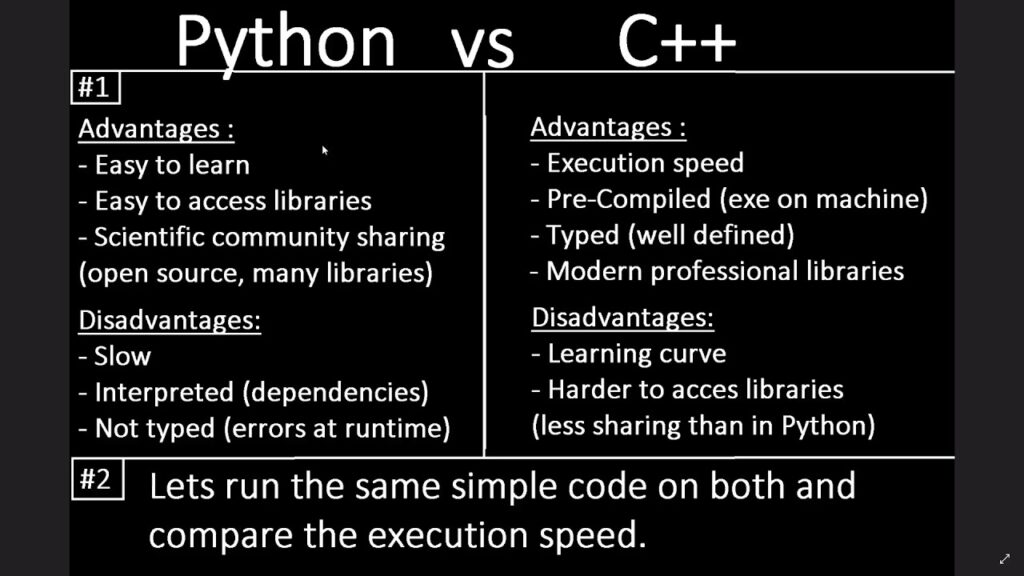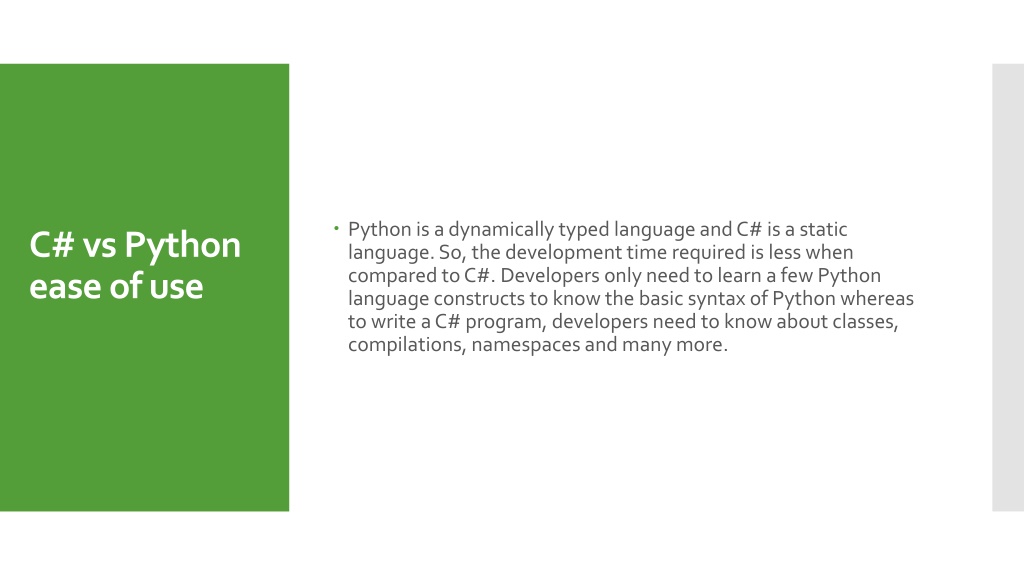Cant Miss Takeaways Of Tips About Is C Harder Than Python

Is C++ Actually Faster Than Python? Datatas
Decoding the Difficulty
1. Which Programming Language Reigns Supreme?
So, you're diving into the world of programming, huh? Excellent choice! Now you're faced with that age-old question: "Is C harder than Python?" It's a question that has plagued aspiring developers for ages. The answer, like most things in the tech world, isn't a simple "yes" or "no." It's more like a nuanced "well, it depends..." Lets break down why and explore what makes each language tick.
Think of it this way: C is like building a house from scratch, laying every brick, wiring every outlet, and installing every pipe. Python, on the other hand, is more like assembling a pre-fabricated home. You still need to understand how things fit together, but a lot of the heavy lifting is already done for you. Both get you a house, but the process is vastly different.
One major difference lies in memory management. C requires you to manually allocate and deallocate memory. Forget to free up memory you're no longer using, and you'll end up with a memory leak, which can cause your program to crash. Python handles memory management automatically, so you don't have to worry about this level of detail. This makes Python much more beginner-friendly.
Another factor is syntax. C has a reputation for being verbose and unforgiving. A misplaced semicolon can bring your entire program to a screeching halt. Python's syntax is cleaner and more readable, resembling plain English. This allows you to focus on the logic of your program rather than wrestling with syntax errors. The difference can be significant, especially when you're just starting. Trust me, debugging C code can be a real test of patience!

How Much Times C++ Is Faster Than Python? Datatas
Delving Deeper
2. Memory Management and Syntactical Nuances
Let's get into the specific challenges each language presents. C, being a lower-level language, offers a much closer interaction with the hardware. This means you have more control, but also more responsibility. You're essentially telling the computer exactly what to do, step by step. This includes managing memory directly, which can be a source of bugs if not handled carefully.
Python abstracts away many of these low-level details. Its dynamic typing and automatic garbage collection handle memory management behind the scenes, freeing you from the burden of manual memory allocation. This makes Python faster to develop with, but it also means you have less control over how the program uses resources. This trade-off is a key consideration when choosing between the two languages. For rapid prototyping or projects where performance isn't critical, Python often wins out.
Syntax also plays a huge role in the perceived difficulty. C uses curly braces `{}` to define code blocks and semicolons ` ;` to terminate statements. Python, on the other hand, uses indentation to define code blocks, making the code more readable and less prone to syntax errors. The simplicity of Python's syntax allows beginners to grasp the fundamentals of programming more quickly.
Furthermore, C requires you to declare the type of each variable explicitly. Python uses dynamic typing, where the type of a variable is inferred at runtime. This can make Python code easier to write and understand, but it also means that type-related errors might not be caught until runtime. This can be both a blessing and a curse, depending on your coding style and preferences.

The Learning Curve
3. A Beginner's Perspective on C and Python
For someone completely new to programming, Python tends to be the easier language to pick up. Its straightforward syntax and focus on readability make it less intimidating. You can quickly start writing simple programs and see results without getting bogged down in complex details. This rapid feedback loop can be very motivating for beginners.
C, on the other hand, has a steeper learning curve. You need to understand concepts like pointers, memory management, and data structures early on. These concepts can be challenging for beginners to grasp, and it takes time and effort to master them. However, once you understand these concepts, you'll have a much deeper understanding of how computers work.
Think of it as learning to drive. Python is like driving an automatic car. You just need to steer and accelerate, and the car takes care of the rest. C is like driving a manual car. You need to coordinate the clutch, the gas pedal, and the gearshift. It's more challenging at first, but once you master it, you'll have a much better understanding of how the engine works.
Ultimately, the choice between C and Python depends on your goals and learning style. If you want to quickly build simple applications and don't care about low-level details, Python is the better choice. If you want to understand how computers work at a deeper level and are willing to invest the time and effort to master more complex concepts, C is the way to go.

Why Is C Faster Than Python? Datatas
Real-World Applications
4. Project-Specific Advantages of Each Language
C remains a powerhouse in systems programming, embedded systems, and game development, particularly where performance is paramount. Operating systems, device drivers, and game engines are often written in C due to its speed and control over hardware. If you're aiming to work on these types of projects, learning C is almost essential.
Python excels in areas like data science, machine learning, web development, and scripting. Its extensive libraries and frameworks make it a popular choice for these applications. For example, libraries like NumPy, Pandas, and Scikit-learn make Python a go-to language for data analysis and machine learning.
Consider this: if you're building a website, Python with frameworks like Django or Flask can significantly speed up the development process. If you're developing a real-time operating system, C is likely the better choice due to its performance characteristics and memory management capabilities. The needs of the project often dictate the appropriate language.
There's also the aspect of legacy systems. Many older systems and applications are written in C, so maintaining or extending them often requires C knowledge. While Python is gaining ground in many areas, C remains a critical language in numerous established industries. This is an important consideration when choosing which language to learn for career advancement.

Estce Que C Est Plus Dur Python ?
The "Is C Harder Than Python" Verdict
5. Final Thoughts and Practical Considerations
So, back to our original question: Is C harder than Python? Objectively, yes, in many ways. C demands a deeper understanding of computer architecture and memory management. It requires more meticulous coding and is less forgiving of errors. Python, with its higher level of abstraction and simpler syntax, is generally easier to learn and use, especially for beginners.
However, difficulty is also subjective. What one person finds challenging, another might find straightforward. Someone with a background in mathematics or computer science might find C's concepts easier to grasp than someone without that background. Someone who enjoys meticulous coding and problem-solving might prefer C's challenges to Python's relative simplicity.
Ultimately, the best way to determine which language is "harder" for you is to try them both. Spend some time learning the basics of each language and see which one clicks with you. Don't be afraid to experiment and see what you enjoy. Programming should be fun, after all! Learning either language will build your programming skills, and many concepts will be transferable.
Remember that the "best" language is the one that helps you achieve your goals. Whether you choose C, Python, or another language altogether, the most important thing is to keep learning and practicing. The world of programming is constantly evolving, so there's always something new to discover. Embrace the challenge and enjoy the journey!

PPT C Vs Python Uncover Which Language You Should Learn In 2023
Frequently Asked Questions (FAQs)
6. Your Burning Questions Answered
Q: Should I learn C or Python first?A: If you're a complete beginner, Python is generally recommended as it's easier to pick up. Once you have a grasp of programming fundamentals, learning C can provide a deeper understanding of how things work under the hood.
Q: Is C still relevant in 2024?A: Absolutely! C is still widely used in systems programming, embedded systems, and performance-critical applications. It's a foundational language that's not going away anytime soon.
Q: Can I use Python for everything?A: While Python is versatile, it's not always the best choice for every task. For tasks requiring maximum performance or direct hardware control, C or other lower-level languages may be more appropriate. Think about the project requirements and choose the tool that best fits the job.
Q: Will knowing C make me a better programmer even if I mainly use Python?A: Yes, absolutely! Understanding C concepts like memory management and pointers provides a valuable foundation that enhances your overall programming skills and can improve your understanding of how Python operates internally.